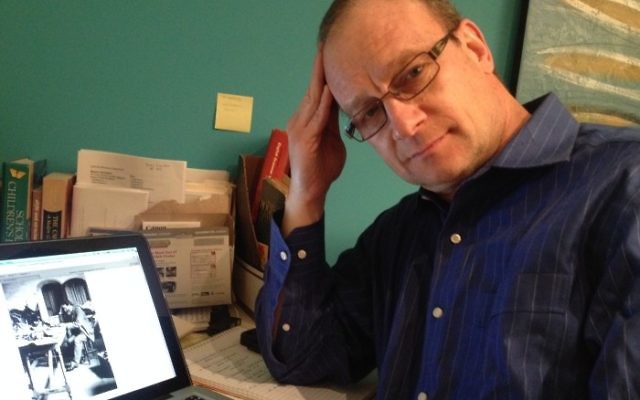From ‘Ballyhoo’ to Havdalah on the Square
Uhry's not-so-fictional "Freitags" of 1939 could not imagine today's open expression of Jewish identity.
Dave Schechter is a veteran journalist whose career includes writing and producing reports from Israel and elsewhere in the Middle East.
Two events on a recent weekend illustrate the psychic distance Atlanta’s Jewish community has traveled in 80 years.
At one end of the timeline was “Last Night of Ballyhoo,” the Tony Award-winning play written by Atlanta native Alfred Uhry, performed by the Stage Door Players in Dunwoody.
Set in December 1939, “Ballyhoo” portrays an Atlanta family that maintains a tenuous relationship with Judaism while seeking acceptance from the gentile world of its Habersham Road neighbors.
The Nazi army has overrun Poland and the Holocaust is beginning, but the extended Freitag family has more pressing concerns at home.
“Ballyhoo,” an annual gathering of Jewish young people from throughout the Southeast, coincides with the Atlanta premier of “Gone With The Wind.” Lala, who has left college, is consumed with Clark Gable, while her mother is fixated on her daughter finding a husband. Meanwhile, Lala’s high-minded cousin, Sunny, has her nose in a book, literally.
Uhry intended for the play’s humor to draw the audience into the tensions in the lives of these status-seeking Jews of German descent, who look down their noses at the presumably less-cultured Jews whose families immigrated from Eastern Europe.
“Germans are clannish, Southerners are clannish, and Jews are clannish. As Southern German Jews, we had a triple whammy. We felt a need to have other people below us, and so we lorded it over Eastern European Jews. Some German Jews called these other Jews ‘kikes,’” Uhry said in a 1997 interview.
“That was us,” Uhry told the interviewer. “My parents told us to keep a low profile. Don’t speak loudly, and don’t be pushy. We tried to appear as non-Jewish as possible, but our noses gave us away. My Jewish face was the cross I had to bear, so to speak.”
Enter Joe, a proud-to-be New York Jew, who works for the girls’ Uncle Adolph. He is smitten with Sunny, but cannot comprehend the lifestyle of these Southern Jews, with their Christmas tree, but no Passover seder.
Joe embodies the Jewish world the Freitags keep at arm’s length. When a suitor for Lala suggests that the Nazis are Europe’s problem, Uncle Adolph replies, “I’d say that depends on where your family is,” a nod to Joe’s concern for relatives in the old country.
Sunny’s attraction to Joe eventually forces her to confront, as she calls it, “a big hole where the Judaism is supposed to be.”
At the other end of the timeline, a Havdalah service led by Rabbi Daniel Dorsch of Congregation Etz Chaim preceded a concert of “Lost and Found Jewish Musical Treasures,” at the Strand Theatre on the Marietta Square.
Two miles from the square, Leo Frank was lynched on Aug. 17, 1915.
An even shorter distance away is the grave of 13-year-old Mary Phagan, who was killed April 26, 1913, in the downtown Atlanta pencil factory where Frank was superintendent.
The decision by Gov. John Slaton to commute Frank’s death sentence to life in prison so enraged Cobb County residents that conspirators kidnapped Frank from the state prison in Milledgeville, then drove him to the woods near Frey’s Gin Road and hanged him before sunrise.
Philip Goldstein’s grandfather operated a clothing store on the square.
After Frank was lynched, handbills warned Jewish merchants to clear out.
“My grandfather gathered up the family, closed up the store and pushed through the crowd toward the trolley,” Goldstein said during a 2015 memorial service for Frank at Etz Chaim. “The mob followed them to the trolley car. Once they reached the trolley car and boarded, the mob went violent and shook the trolley car. For my nine-year-old uncle and my seven-year-old aunt, they were flat-out terrified.”
After the event at the Strand, Goldstein said that his grandfather “would be quite pleased and surprised that we were doing Havdalah in this very location.”
The not-so-fictional Jews in “Ballyhoo” suppressed outward expression of their religious identity. Today’s Atlanta Jewish community enters the public square confidently, whether celebrating Chanukah on the BeltLine or marking the end of Shabbat just down the road from the site of a historic act of anti-Semitism.




comments